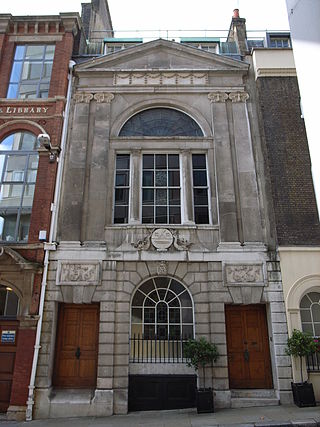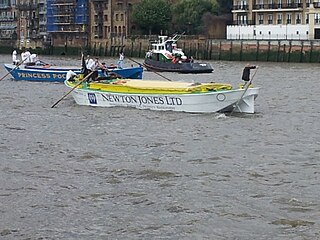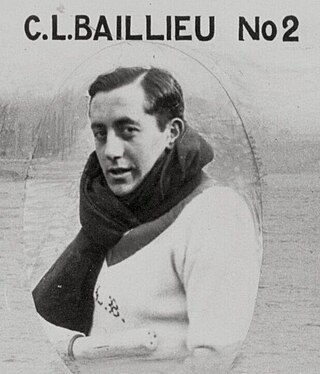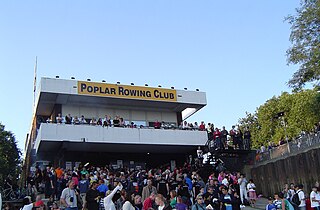Related Research Articles

A lighterman is a worker who operates a lighter, a type of flat-bottomed barge, which may be powered or unpowered. In the latter case, it is usually moved by a powered tug. The term is particularly associated with the highly skilled men who operated the unpowered lighters moved by oar and water currents in the Port of London.
The Company of Watermen and Lightermen (CWL) is a historic City guild in the City of London. However, unlike the city's 111 livery companies, CWL does not have a grant of livery. Its meeting rooms are at Waterman's Hall on St Mary at Hill, London.

Vesta Rowing Club is a rowing club based on the Tideway of the River Thames in Putney, London, England. It was founded in 1870.

Doggett's Coat and Badge is the prize and name for the oldest continuous rowing race in the world. Up to six apprentice watermen of the River Thames in England compete for this prestigious honour, which has been held every year since 1715. The 4 mile 5 furlongs race is rowed on the River Thames upstream from London Bridge to Cadogan Pier, Chelsea, passing under a total of eleven bridges. Originally, it was raced every 1 August against the outgoing tide, in the boats used by watermen to ferry passengers across the Thames. Today it is raced at a time amenable to spectators, in September, that coincides with the incoming tide, in contemporary single sculling boats.
Timothy John Crooks is a former British rower who competed at the 1972 Summer Olympics and the 1976 Summer Olympics. He was seven times winner at Henley Royal Regatta and won the Wingfield Sculls three times.

The King's Bargemaster is a subordinate officer of the Royal Household of the Sovereign of the United Kingdom. Until the mid-19th century, the Royal Family frequently used a royal barge for transport along the River Thames. The role of the King's Bargemaster was to oversee this. The tradition of the Bargemaster dates back to 1215, with the signing of Magna Carta at Runnymede. The role is now largely ceremonial.

A waterman is a river worker who transfers passengers across and along city centre rivers and estuaries in the United Kingdom and its colonies. Most notable are those on the River Thames and River Medway in England, but other rivers such as the River Tyne and River Dee, Wales, also had their watermen who formed guilds in medieval times. Waterman can also be a person who navigates a boat carrying passengers. These boats were often rowing boat or boats with sails. Over the years watermen acquired additional skills such as local pilotage, mooring vessels at berths, jetties, buoys, and docks, and acting as helmsman aboard large vessel.
Julius Beresford (Wiszniewski) (18 July 1868 – 29 September 1959), also known as Berry or The Old Berry, was a British rower and coach. Beresford competed at the 1912 Summer Olympics in Stockholm, Sweden.

The Thames Barge Driving Race or Barge Race is a river-race that was set up in 1975 by a charity called The Transport On Water Association (TOW), founder members being Jack Faram, Jonnie McSweeney, Ron Livett, Don Able and Peter House, now known as the Thames Barge Driving Trust with the backing of Members of Parliament and Members of the House of Lords in the United Kingdom.
The Thames Challenge Cup is a rowing event for men's eights at the annual Henley Royal Regatta on the River Thames at Henley-on-Thames in England. It is open to male crews from a single rowing club.

The Britannia Challenge Cup is a rowing event for men's coxed fours at the annual Henley Royal Regatta on the River Thames at Henley-on-Thames in England. It is open to male crews from a single rowing club.
The Thames is one of the main rowing rivers in Europe. Several annual competitions are held along its course, including the Henley Royal Regatta, The Boat Race and other long-distance events, called Head of the River races (Heads).

Christopher Latham Baillieu MBE is an English former rower who competed in the 1976 Summer Olympics and in the 1980 Summer Olympics representing Great Britain. He was the first chairman of British Swimming, from 2001 to 2008.

Poplar Blackwall and District Rowing Club is a rowing club in Millwall, on the River Thames in England, on the northern bank of the Thames opposite Greenwich on the Isle of Dogs, London.

Alexander Alcée Casamajor was a British rower who won the Wingfield Sculls in six successive years and the Diamond Challenge Sculls at Henley Royal Regatta as well as being twice in the winning Grand Challenge Cup team.
Patrick Geoffrey Robert "Pat" Delafield is a British former rower and businessman. He competed for Great Britain in the 1972 Summer Olympics.
David Philip Sturge is a former British rower who competed for Great Britain in the 1976 Summer Olympics.

James Arthur Messenger was a British sculler who was the world champion from 1854 to 1857. He served as the Queen's Bargemaster from 1862 to 1901. He resided in Teddington. In 1854 he became the Champion of the Thames which was effectively the English Sculling Championship and the World Sculling Championship. The English title gained the world status in 1876, earlier winners were retrospectively given the world champion title. In 1862 he won the famed Doggett's Coat and Badge, which claims to be the oldest sporting championship in the world. There is some confusion as to whether James Messenger who won the World Sculling Championship in 1854 is the same person, recorded as John Messenger of Cherry Garden Stairs, who won the Doggett's Coat and Badge in 1862.
William Giles East (1866–1932), was an English sculler.
Beryl Crockford was a world-champion and Olympic rower who represented Great Britain from 1975 to 1986. In 1985 she married Duncan Crockford and competed as Beryl Crockford afterwards, previously she had competed under her divorced name of Beryl Mitchell..
References
- 1 2 PORT OF LONDON, MARCH/APRIL 2003 [ permanent dead link ]
- ↑ Henley Royal Regatta Results of Final Races 1946–2003 Archived 16 July 2011 at the Wayback Machine
- ↑ Sports Reference Olympic Sports – Kenneth Dwan
- ↑ Wingfield Sculls Record of Races
- ↑ "Doggett's Winners from 1715". Watermen and Lightermen. Retrieved 23 April 2020.
- ↑ "Railton, Jim. "Rowing." Times, 23 July 1973, p. 7". Times Digital Archives.
- ↑ "Railton, Jim. "Marriage of two quads promises something special for Lucerne." Times, 22 July 1974, p. 8". Times Digital Archives.
- ↑ "Railton, Jim. "Rowing." Times, 21 July 1975, p. 6". Times Digital Archives.
- ↑ Telegraph – Andrew Sparrow and Peter Foster Lookouts could have prevented the collision 24 Mar 2001
- ↑ Evening Standard Patrick Sawer and Clair Weaver Bargemaster quits over disaster links 22 January 2004
- ↑ Kenny Dwan Tells His Emotional Story of Recovering from Coronavirus, Good Morning Britain, 22 April 2020